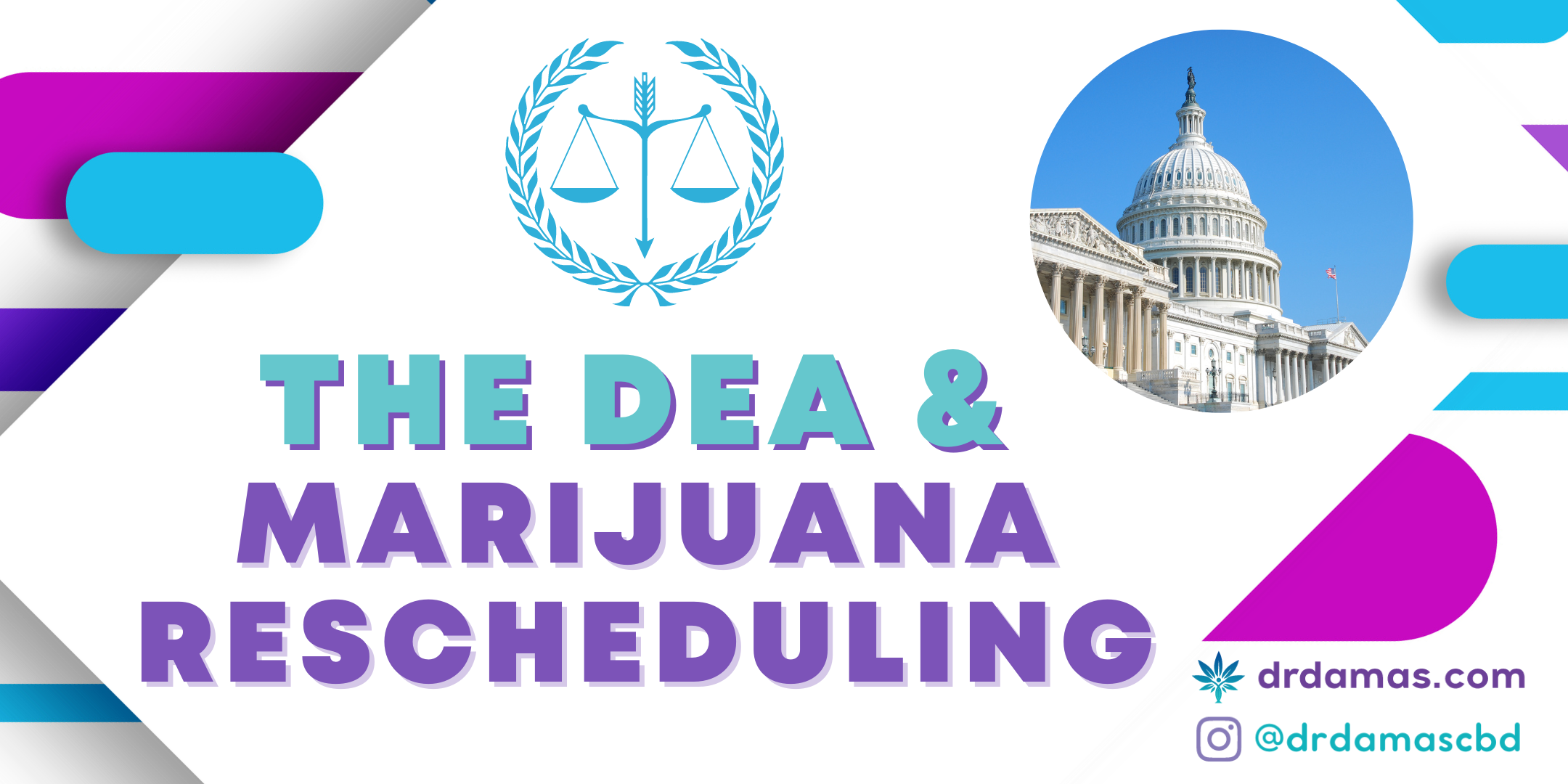DEA's Move to Reclassify Marijuana: How Will it Impact Your Life?
We’ve discussed Marijuana policy reform on a few occasions.The recent recommendation by the Drug Enforcement Administration (DEA) to reclassify marijuana as a Schedule III drug marks a significant turning point in U.S. drug policy. This change reflects a growing understanding of marijuana's medical potential and a broader shift in social attitudes, with a 2021 Pew Research Center poll showing 88% of U.S. adults favoring legal marijuana for medical use. With this being one of the most significant issues in recent election years, it's important for us to take a good look at the historical context, implications of Schedule III classification, and how it will affect our lives moving forward.
Pearl:
Despite its current Schedule I classification, a 2017 report by the National Academies of Sciences, Engineering, and Medicine found conclusive evidence that marijuana is effective in treating chronic pain and muscle spasms.
The term "marijuana" has its roots in Mexican Spanish and was popularized in the U.S. during the early 20th century as part of a campaign to criminalize cannabis use.
Understanding the Drug Scheduling System
Under the Controlled Substances Act (CSA), substances are classified into five schedules based on their medical use, potential for abuse, and safety:
Schedule I: No accepted medical use, high potential for abuse (e.g., heroin, LSD, marijuana).
Schedule II: Accepted medical use, high potential for abuse (e.g., cocaine, morphine).
Schedule III: Accepted medical use, moderate to low potential for abuse (e.g., codeine, anabolic steroids).
Schedule IV: Accepted medical use, low potential for abuse (e.g., Xanax, Valium).
Schedule V: Accepted medical use, lowest potential for abuse (e.g., cough preparations with less than 200 mg of codeine).
Marijuana's current classification as a Schedule I drug has restricted research, access, and medical use. Moving marijuana to Schedule III represents a pivotal change, with a 2023 Gallup poll showing 70% of Americans supporting full legalization.
Pearl:
The scheduling system under the Controlled Substances Act was initially created to provide a framework for regulating drugs based on their medical value and potential for abuse, but the process for rescheduling drugs has been criticized as slow and politicized.
While marijuana remains a Schedule I drug at the federal level, the FDA has approved several drugs containing synthetic versions of THC, the primary psychoactive compound in cannabis, such as Marinol and Cesamet.
Let’s Put it in Perspective
The road to marijuana reclassification has been very long with lots of very significant events along the way. Over the past 80 years there have been major legislative acts at both the federal and state levels. Reclassification would be the first significant federal action that would significantly undo the existing strict prohibition policies.
1937: The Marijuana Tax Act effectively banned cannabis through stringent regulations.
1970: The Controlled Substances Act classified marijuana as a Schedule I drug.
1996: California became the first state to legalize medical marijuana, challenging federal laws. As of 2023, 37 states have legalized medical marijuana programs.
2018: The Farm Bill legalized hemp and CBD products with less than 0.3% THC, paving the way for the booming hemp and CBD industry projected to reach $16.8 billion by 2027 (Grand View Research).
Over time, these events reflect changing attitudes toward marijuana and an acknowledgment of its medical potential, with a 2024 Pew Research Center survey showing an amazing 88% of U.S. adults supporting marijuana legalization.
Pearl:
The Marijuana Tax Act of 1937 was prompted, in part, by a sensationalized propaganda film called "Reefer Madness," which portrayed cannabis use as leading to violence and insanity.
While the 2018 Farm Bill legalized hemp at the federal level, individual states still have the authority to regulate or prohibit the cultivation and sale of hemp and hemp-derived products within their borders.
Implications of Schedule III Reclassification
Medical and Research Implications:
A Schedule III designation could pave the way for expanded medical research like the study I led investigating the effects of CBD on quality of life in former elite level athletes. It would ease current restrictions, allowing physicians, researchers and scientists to conduct studies more freely and enabling healthcare providers to prescribe marijuana-based treatments, addressing the growing demand for medical cannabis products projected to reach $47.2 billion by 2027 (Data Bridge Market Research).
Legal and Social Implications:
This reclassification could influence criminal justice policies, leading to the potential reduction or elimination of penalties for possession, with a 2020 ACLU report showing over 600,000 marijuana-related arrests annually. It might also open doors for expungement of records for non-violent marijuana offenses, addressing the disproportionate impact on communities of color.
Impact on Hemp and CBD Industry:
Reclassification might blur the regulatory lines between marijuana and hemp-derived CBD, especially following the 2018 Farm Bill. This could lead to new regulations and tighter scrutiny over the burgeoning hemp and CBD industry, which continues to find new areas for growth.
Pearl:
While the FDA has approved several cannabis-derived drugs, such as Epidiolex for treating seizures, the agency has warned that CBD products, including supplements and foods, are still considered illegal and subject to enforcement action.
Several states, including New York and New Mexico, have taken steps to automatically expunge or pardon past marijuana convictions following legalization, recognizing the disproportionate impact of such laws on marginalized communities.
How Soon Will it Happen?
The DEA's recommendation is just the beginning of a multi-step process. After a period of public comment and a review by the Department of Health and Human Services (HHS), the DEA will make a final rule. This process could take several months or longer, depending on public and political responses, especially with the well known partisan divide on marijuana legalization among legislators.
Pearl:
The rescheduling process for marijuana has been subject to numerous legal challenges and administrative delays over the years, with the DEA denying previous petitions to reschedule or deschedule cannabis as recently as 2016.
While the DEA is responsible for enforcing federal drug laws, individual states have the authority to enact their own laws regarding the cultivation, distribution, and use of marijuana within their borders, leading to a patchwork of conflicting laws across the country.
Impact on State Programs and Users State-run medical and recreational marijuana programs, which generated over $3.7 billion in tax revenue in 2021 (Marijuana Policy Project), could see increased legitimacy and reduced conflict with federal laws. However, they might still face restrictions in production, distribution, and sale. This could also have broader implications for the estimated 4.4 million medical marijuana patients (Cannabis Industry Journal) and recreational users, who may see expanded access and reduced stigma.
Pearl:
Despite state-level legalization efforts, marijuana businesses still face significant challenges, such as limited access to banking services and the inability to deduct certain business expenses due to federal tax laws.
Medical marijuana programs vary widely across states, with different qualifying conditions, possession limits, and regulations surrounding cultivation and dispensaries. For example, New Mexico allows medical cannabis for conditions like Crohn's disease and opioid use disorder, while New Jersey's list includes anxiety and chronic pain.
Wrappin it All Up!
The DEA's move to reclassify marijuana marks a pivotal moment in U.S. cannabis policy. While it's a step toward aligning federal policy with current scientific understanding and social attitudes, the work is far from over. There is a history of significant damage done to generations of communities of color that must be addressed. There are also issues regarding equitable participation in both the medical and commercial aspects of the burgeoning industry. Lots of moving parts that have not been working in unison have to come together in order to ensure the full potential of reclassification is realized, and allowing full and equitable access to the estimated $70.6 billion global legal marijuana market by 2028.
Pearls:
Despite increasing legalization, marijuana remains a Schedule I substance under international drug control treaties, which could pose challenges for countries looking to reform their cannabis policies.
The potential reclassification of marijuana has reignited debates around issues such as impaired driving, workplace drug testing policies, and advertising regulations, highlighting the need for comprehensive regulatory frameworks to address these concerns.















